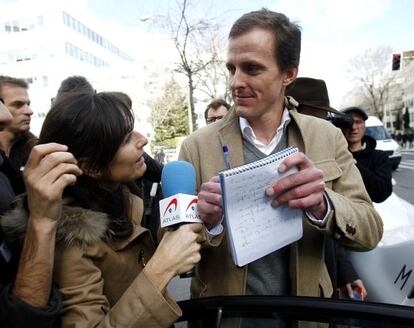Puerto cyclist witness lifts lid on extent of doping in the sport
"When time was short, the bag of blood wasn’t warm enough and your arm would go cold”

The ongoing Operation Puerto trial in Madrid saw cyclists Jorg Jaksche and Ivan Basso take the stand on Monday. Both athletes spared no detail of the extent of doping in the sport, but did differ in their claims about the people behind it.
“The same people that push us into doping later point the finger so that they can appear clean and look good in front of everybody,” said Jaksche during his testimony. They have the big advantage that they can’t be tested and give a positive sample.”
Asked by the lawyer representing the Italian Olympic Committee if he was referring to the sporting directors of the teams he had represented, Jaksche said no. “The managers of the team, the administrators; the people who run the team.”
Jaksche raced for Polti, Team Telekom, ONCE, CSC and Liberty during his career, and stated that he used doping products at each one of them. The German rider also left no doubt as to the influence of Eufemiano Fuentes, the chief accused, in the process. “In January, 2005 he told me that we had to meet and I had to go to Gran Canaria and combine training sessions. He didn’t speak about doping on the telephone but when I met him he said very quickly what he was about. He asked what I wanted to do in doping and that he could get me all the medication. He gave me blood transfusions and gave me EPO, anabolic steroids, IGF-1 and artificial hemoglobin. He also gave me some white powders that would reduce detection in a urine test.”
Jaksche confessed to paying Fuentes an annual 15,000 euros and that he saw the doctor “10 or 15 times a year,” to have blood extracted or reinfused. He also stated that Fuentes provided him with gonadotropin, a female hormone. “He prescribed it in the name of a woman he knew.”
Jaksche said that the extractions were carried out “90 percent of the time by Fuentes, and once or twice by Merino [Batres, who was spared standing trial due to suffering from an illness similar to Alzheimer’s].”
Contrary to claims by Fuentes that the transfusions were carried out in “optimum conditions,” Jaksche said quite the opposite. “I was scared, I heard that they had swapped the bags. Sometimes, when time was short, the bag of blood wasn’t warm enough and your arm would go cold. Sometimes I went home on the plane feeling bad. Once I had heart palpitations on the way to the airport.”
“In the end it is the athletes who pay,” Jaksche continued. But for all the risks to health that surround it, nobody pays in terms of responsibility.”
The lawyer acting for the World Anti-Doping Agency asked if Liberty had given its team members a document to sign denying involvement in Operation Puerto. “They gave us a paper for the sponsors that we had to sign, saying we had not taken any kind of medication and that we had nothing to do with Eufemiano Fuentes or Operation Puerto. I thought it was ridiculous, because these were the same people that gave us the opportunity to go and see Dr Fuentes to dope.”
After the German’s testimony, Basso took the stand. The Italian, who won the Giro in 2006 and 2010, served a two-year ban after admitting his intention to cheat. “Ever since I was a kid I wanted to be the best cyclist in the world,” he told the court Monday. Basso said he decided to go to Fuentes of his own volition in 2001, but did not become a client until 2005.
“It was my own thing, neither my team nor my family knew.” The rider confessed he had intended to use blood transfusions carried out by Fuentes and Batres before the 2006 Tour de France. “Freezing allows blood to be preserved for many years, but I didn’t have the chance to use it,” he said.
Basso said he reached a deal with Fuentes to pay him 70,000 euros for the 2006 season, but only paid an advance of 15,000 euros in cash before Fuentes was arrested in May of the same year.
“I think I am the only person who has paid who has paid for all this,” Basso said in reference to his ban. He added that he had decided to testify because it was “the morally right thing to do.”
Fuentes and four co-defendants stand accused of crimes against public health, which carry a maximum jail sentence of two years if they are found guilty. The trial is expected to last until April.
Tu suscripción se está usando en otro dispositivo
¿Quieres añadir otro usuario a tu suscripción?
Si continúas leyendo en este dispositivo, no se podrá leer en el otro.
FlechaTu suscripción se está usando en otro dispositivo y solo puedes acceder a EL PAÍS desde un dispositivo a la vez.
Si quieres compartir tu cuenta, cambia tu suscripción a la modalidad Premium, así podrás añadir otro usuario. Cada uno accederá con su propia cuenta de email, lo que os permitirá personalizar vuestra experiencia en EL PAÍS.
¿Tienes una suscripción de empresa? Accede aquí para contratar más cuentas.
En el caso de no saber quién está usando tu cuenta, te recomendamos cambiar tu contraseña aquí.
Si decides continuar compartiendo tu cuenta, este mensaje se mostrará en tu dispositivo y en el de la otra persona que está usando tu cuenta de forma indefinida, afectando a tu experiencia de lectura. Puedes consultar aquí los términos y condiciones de la suscripción digital.








































